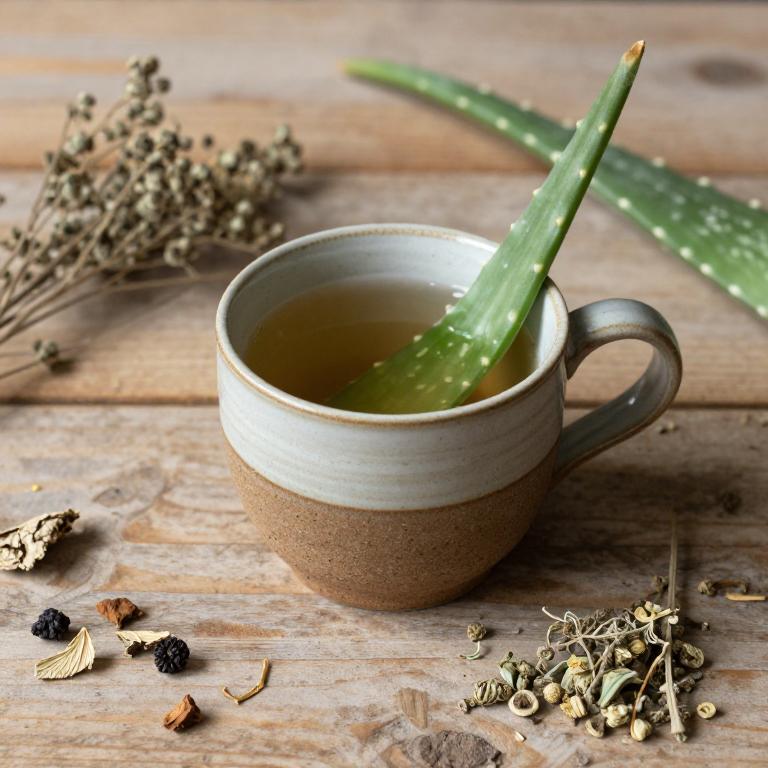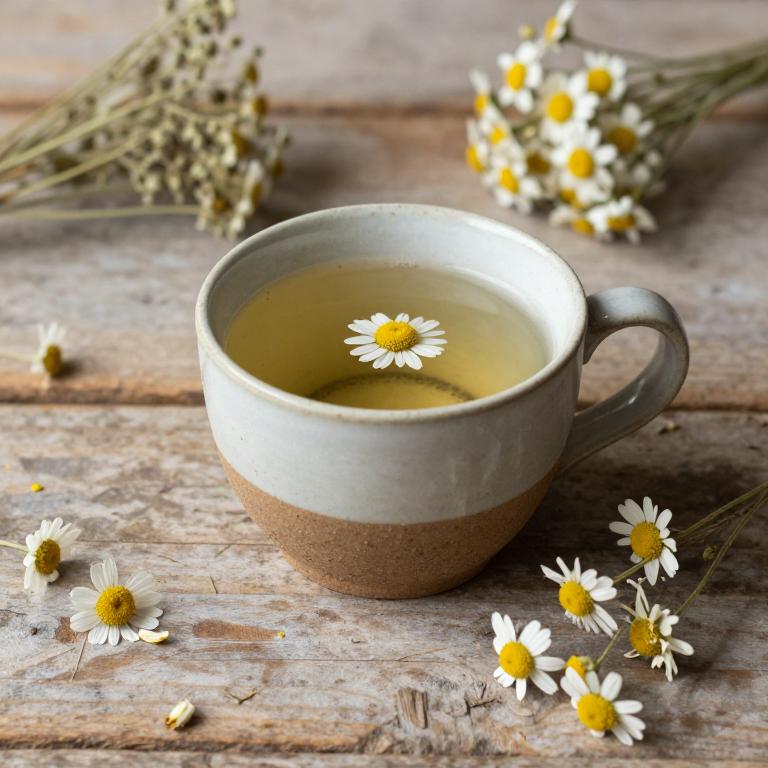10 Best Herbal Teas For Dry Skin

Herbal teas can be a gentle and effective way to nourish and soothe dry skin, as many herbs possess anti-inflammatory and moisturizing properties.
Chamomile, lavender, and calendula are popular choices known for their calming and hydrating effects. These teas can be applied topically as a compress or used in a bath to help alleviate dryness and irritation. Additionally, drinking herbal teas can support overall skin health by promoting internal hydration and reducing stress, which can exacerbate dry skin.
Incorporating herbal teas into a skincare routine can offer a natural, affordable, and soothing alternative to commercial moisturizers.
Table of Contents
- 1. Camellia (Camellia sinensis)
- 2. Aloe vera (Aloe barbadensis)
- 3. Stinging nettle (Urtica dioica)
- 4. Thistle (Silybum marianum)
- 5. Chamomile (Matricaria chamomilla)
- 6. Field horsetail (Equisetum arvense)
- 7. German chamomile (Chamomilla recutita)
- 8. Rosemary (Rosmarinus officinalis)
- 9. Dog rose (Rosa canina)
- 10. St. john's wort (Hypericum perforatum)
1. Camellia (Camellia sinensis)

Camellia sinensis, the plant from which green and black teas are derived, is also used to make herbal teas that can benefit dry skin due to its high antioxidant and anti-inflammatory properties.
These teas contain polyphenols, such as catechins, which help to reduce inflammation and promote skin hydration. Regular consumption of Camellia sinensis herbal teas may improve skin texture and reduce the appearance of dryness and flakiness. The mild caffeine content in these teas can also stimulate blood circulation, enhancing nutrient delivery to the skin.
Overall, incorporating Camellia sinensis herbal teas into a skincare routine may offer a natural and gentle way to support skin health and alleviate dryness.
2. Aloe vera (Aloe barbadensis)

Aloe barbadensis, commonly known as aloe vera, is a popular herbal ingredient used in teas to support skin health, particularly for those with dry skin.
These teas are valued for their soothing properties, which can help reduce inflammation and irritation. The plant’s gel contains vitamins, minerals, and antioxidants that contribute to moisturizing and repairing the skin's natural barrier. Drinking aloe barbadensis tea may promote internal hydration, which can have a positive effect on the skin’s overall appearance.
However, it is important to consult a healthcare professional before incorporating it into your routine, especially if you have existing health conditions or are pregnant.
3. Stinging nettle (Urtica dioica)

Urtica dioica, commonly known as stinging nettle, is a versatile herb that has been used for centuries in traditional medicine.
When brewed into a herbal tea, it can provide numerous benefits for individuals with dry skin due to its high content of vitamins, minerals, and antioxidants. The anti-inflammatory properties of stinging nettle help reduce skin irritation and redness, while its ability to improve circulation can enhance moisture retention in the skin. Regular consumption of urtica dioica tea may also support the body's natural detoxification processes, promoting overall skin health.
However, it is important to consult with a healthcare provider before incorporating this herb into your routine, especially if you have any pre-existing medical conditions or are taking medications.
4. Thistle (Silybum marianum)

Silybum marianum, also known as milk thistle, is a herbal remedy that has gained popularity for its potential benefits in improving skin health.
When used in the form of herbal tea, silybum marianum may help nourish and hydrate dry skin due to its high content of antioxidants and essential fatty acids. The active compound, silymarin, is believed to support skin regeneration and reduce inflammation, making it beneficial for those with dry, irritated skin. Regular consumption of milk thistle tea may promote a more balanced skin moisture level and enhance overall skin texture.
However, it is advisable to consult a healthcare professional before incorporating this herbal tea into a skincare routine, especially for individuals with existing health conditions or allergies.
5. Chamomile (Matricaria chamomilla)

Matricaria chamomilla, commonly known as chamomile, is a popular herbal tea renowned for its soothing properties, particularly beneficial for dry skin.
This tea contains essential oils and flavonoids that help reduce inflammation and irritation, making it ideal for those with sensitive or dry skin conditions. When applied topically or consumed internally, chamomile tea can promote skin hydration and improve its overall texture. Its mild antiseptic and antioxidant properties also aid in healing minor skin irritations and preventing further dryness.
Regular use of chamomile herbal tea can offer a natural and gentle way to nurture and restore the skin's moisture balance.
6. Field horsetail (Equisetum arvense)

Equisetum arvense, commonly known as field horsetail, is a traditional herbal remedy that has been used for centuries to support skin health.
Its high concentration of silica makes it particularly beneficial for dry skin, as it helps strengthen the skin's structure and improve moisture retention. When brewed into a herbal tea, equisetum arvense can be consumed internally to promote overall skin hydration from within. However, it is important to use it in moderation, as it contains natural silica which may have a diuretic effect.
For best results, it is often combined with other calming herbs like chamomile or lavender to enhance its soothing properties for dry, sensitive skin.
7. German chamomile (Chamomilla recutita)

Chamomilla recutita, commonly known as German chamomile, is a popular herbal tea used for its soothing and anti-inflammatory properties, making it especially beneficial for dry skin.
This tea contains compounds like bisabolol and flavonoids, which help to calm irritation and promote skin hydration. When applied topically or consumed internally, chamomile tea can reduce redness and enhance the skin’s natural moisture barrier. It is often recommended for those with eczema, psoriasis, or sensitive skin due to its gentle yet effective nature.
Regular use of chamomilla recutita herbal tea can lead to a noticeable improvement in skin texture and overall comfort.
8. Rosemary (Rosmarinus officinalis)

Rosmarinus officinalis, commonly known as rosemary, is a herb widely used in herbal teas for its therapeutic benefits, particularly for dry skin.
The essential oils in rosemary tea help to improve blood circulation and stimulate the skin’s natural renewal process, which can enhance skin hydration and elasticity. Its anti-inflammatory and antioxidant properties help reduce redness and irritation, making it beneficial for those with sensitive or dry skin conditions. When consumed regularly, rosemary tea can also support overall skin health from within by promoting detoxification and balancing internal body functions.
However, it is important to use rosemary tea in moderation and consult a healthcare professional if you have specific skin concerns or medical conditions.
9. Dog rose (Rosa canina)

Rosa canina, also known as rosehip, is a popular herbal ingredient used in teas to support skin health, particularly for those with dry skin.
The tea is rich in essential nutrients like vitamin C, omega fatty acids, and antioxidants, which help to nourish and hydrate the skin from within. Regular consumption of rosa canina tea can improve skin elasticity and reduce the appearance of dryness and flakiness. Its anti-inflammatory properties also help to soothe irritated skin and promote a more radiant complexion.
As a natural and gentle remedy, rosa canina herbal tea offers a holistic approach to addressing dry skin concerns through internal hydration and skin renewal.
10. St. john's wort (Hypericum perforatum)

Hypericum perforatum, commonly known as St. John's Wort, is a herbal plant often used to make teas that may benefit individuals with dry skin.
The tea is believed to have anti-inflammatory and antioxidant properties that can help soothe and moisturize dry, irritated skin. When applied topically or consumed internally, it may support skin health by improving circulation and reducing redness. However, it is important to consult a healthcare provider before using St. John's Wort, as it can interact with certain medications.
Despite its potential benefits, more research is needed to fully understand its effects on skin conditions.